Login to your account
- Prescription included
- Genuine medication
- All-inclusive service - No hidden fees
- Free next-day delivery
Dalacin Cream
Buy Dalacin with free shipping and discreet packaging
15,505 Patient reviews
What is Dalacin?
Dalacin is a vaginal cream used to treat bacterial vaginosis (BV), an infection that causes unusual vaginal discharge and a strong odour. It works by killing the bacteria causing the infection.
It provides direct relief for BV symptoms such as itching and irritation. It comes as a cream you insert directly into the vagina using plastic applicators.
You use one applicator once daily at night for 7 days to completely treat the infection.
How does Dalacin work?
Dalacin cream contains the active ingredient clindamycin. Clindamycin is a type of antibiotic.
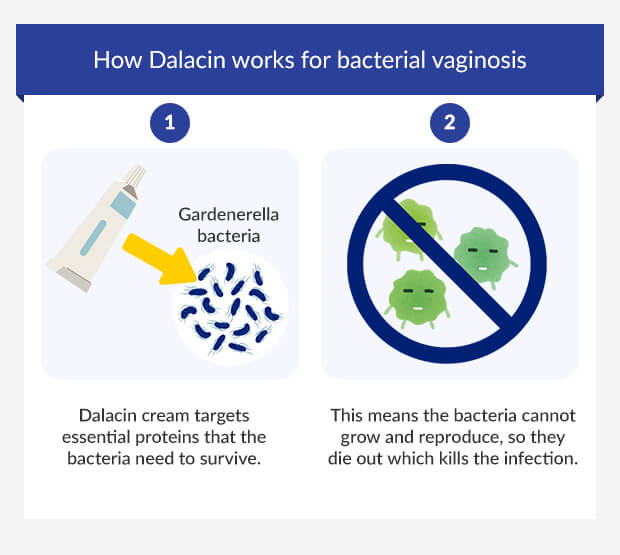
Clindamycin works by killing the bacteria in the vagina that cause BV, the most common being Gardenerella vaginalis. More specifically, it targets essential proteins that the bacteria need to survive.
This means the bacteria cannot grow and reproduce, which kills the bacteria and clears the bacterial vaginosis infection.
What are the benefits of Dalacin?
Dalacin has unique benefits when it comes to treating bacterial vaginosis:
- It speeds up recovery - using Dalacin cream ensures your BV symptoms clear within 7 days compared to not using treatment.
- It provides direct relief - applying the cream into the vagina means it can directly target irritation, giving you instant relief.
- Simple to use - it is easy to apply and you only have to use it once a night for 7 days.
It’s an effective, fast-acting and simple treatment for BV.
How effective is Dalacin?
Dalacin is an effective treatment for bacterial vaginosis. Research has found that 88% of women using Dalacin had no symptoms 1-2 weeks after treatment, compared to 50% of women who didn’t.
Who can use Dalacin?
Dalacin vaginal cream is suitable for most women with bacterial vaginosis.
However, you should always ask your doctor before using any new medication if you have a medical condition.
Our doctors at euroClinix will be able to know if it’s suitable for you when you complete our consultation form about your medical history before prescribing you the medication.
Who cannot use Dalacin?
You should not use Dalacin if you are allergic to Clindamycin or any of the other inactive ingredients.
The use of Dalacin cream should also be avoided in young girls who are not sexually active.
You should also see your doctor before using Dalacin if you have an inflammatory bowel disease (IBD) or a history of diarrhoea whilst taking antibiotics.
How do I use Dalacin?
When to use it
You should apply Dalacin once daily for 7 days. You should apply the cream each night before you go to bed.
How to use it
Dalacin needs to be applied to the vagina using a plastic applicator. This allows you to insert the cream through the vagina and into the cervix.
You use one applicator for each dose. An applicator holds 5g of Dalacin cream.
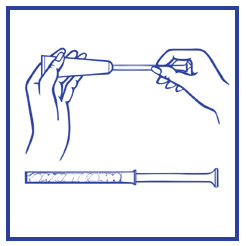
|
Preparing a dose |
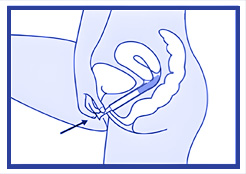
|
Applying the cream |
What happens if I miss a dose?
If it has been a few hours since you were supposed to apply the cream, apply it as soon as you remember. If it is nearly time for your next dose, skip the missed dose and take your next dose at the usual time.
Do not use more cream than you are supposed to. Ask your doctor for advice if you use too much of it.
How long does it take to work?
You should start to feel better within a few days of using Dalacin cream. However, you must use it for the full 7 days as instructed.
Stopping antibiotics early may cause the infection to come back or become resistant to antibiotic treatment.
What lifestyle changes should I make whilst taking Dalacin?
It’s important not to further disrupt the balance of bacteria in the vagina whilst you have bacterial vaginosis, as this can lead to irritation and future infections.
Simple hygiene practices can reduce your symptoms and prevent the infection from returning, such as:
- not using perfumed soaps or bubble baths to wash
- washing with plain water and soap
- not using vaginal deodorants, washes or douches
- having showers instead of baths
- using mild detergents to wash your underwear
Doing these things will help speed up your recovery and prevent future infections.
What are the side effects of Dalacin?
Dalacin cream is generally well-tolerated and rarely causes side effects.
However, it is not uncommon to experience some inflammation or discomfort in your cervix from applying the cream.
This should go away on its own once you have finished treatment. However, if these side effects do not go away consult your doctor for more advice.
Rare side effects
You are unlikely to experience rare side effects of Dalacin cream. They are rarely reported and therefore their frequency is not known.
|
|
You should discontinue Clindamycin immediately if you experience severe diarrhoea and talk to your doctor if it continues.
Some women also experience vaginal thrush after BV treatment. This is because antibiotics sometimes kill some of the good bacteria that prevent an overgrowth of yeast.
Thrush typically goes away on its own, but there are also prescription treatments like Fluconazole or Canesten that can quickly treat the yeast infection.
Does Dalacin interact with other medicines?
Dalacin cream may interact with other medicines you take. So, it’s important to ask your doctor first before using it.
Tell your doctor if you have recently taken erythromycin (an antibiotic), as it may interact with Dalacin.
For a full list of interactions, visit here.
What safety advice should be followed when using Dalacin?
 Safety Tips
Safety Tips If you are pregnant, think you may be pregnant, or are planning to have a baby, ask your doctor for advice before using Dalacin Cream.
Inform your doctor if you are breastfeeding while using Dalacin Cream, as the active substance may pass into breast milk. Your doctor will decide if it is suitable for you.
No specific interactions between Dalacin cream and alcohol are noted. Limit your alcohol intake if you experience side effects.
Dalacin cream does not typically impair your ability to drive or operate machinery.
Do not rely on condoms or contraceptive diaphragms during treatment and for 3 days after, as Dalacin cream may weaken these devices, increasing the risk of contraceptive failure.
Do not start using Dalacin cream if you are menstruating. Wait until your period has finished before beginning treatment.
Avoid sexual intercourse during treatment with Dalacin Cream, as it may reduce the effectiveness of condoms and diaphragms, potentially leading to contraceptive failure.
How do I store Dalacin?
Do not store Dalacin in temperatures above 25°C. Keep it out of sight and reach of children.
You should also not use it past the expiry date. You can see the expiry date on the medicine carton after EXP. The date refers to the last day of the month.
How do I dispose of Dalacin?
You should take any unused or expired Dalacin cream to a pharmacy to be disposed of. Do not dispose of the cream in the general waste.
You may dispose of the plastic applicators in your general waste but you should wrap them up in paper.
Do not dispose of the cream or the applicators by flushing them down the toilet. This is harmful to the environment.
Can I buy Dalacin without a prescription?
No, Dalacin is a prescription-only medication. You need a valid prescription from a healthcare professional to purchase it. This ensures the medication is safe and suitable for your needs.
You can receive an online prescription from euroClinix.
How do I buy Dalacin online from euroClinix?
Ordering Dalacin through euroClinix is simple and secure. Follow these steps:
- Start a confidential online questionnaire from the top of this page. Completing it takes about 5-10 minutes.
- A UK-registered doctor will review your consultation.
- If approved, the doctor will issue an electronic prescription.
- A licensed UK pharmacy sends your medication in discreet packaging. The pharmacy will also share tracking information. You get free with next-day delivery.
euroClinix offers ongoing support for any questions. Privacy and security are guaranteed through compliance with the relevant regulatory standards and the use of encrypted transactions.
Why should I choose euroClinix?
euroClinix is a trusted online clinic that offers services in several European countries. All consultations and prescriptions are handled by our UK-registered doctors.
The process is convenient with online consultations and discreet home delivery. Our friendly customer service team is always happy to assist with any questions related to our services.
The euroClinix platform is user-friendly for managing prescriptions and reorders securely.
Choosing euroClinix ensures a trusted, professional, and supportive service to treat bacterial vaginosis.
What are the alternatives to Dalacin?
There are two alternatives available at euroClinix: Fluomizin and Metronidazole. They are all equally effective at treating BV and are available as oral and vaginal tablets respectively.
Frequently asked questions
Note: You must complete a short online consultation so that our doctor can ensure that the treatment is suitable for you. The above pricing should only be used as a reference. The final decision to issue this treatment lies with the prescribing doctor.
| Group of medication | Antibiotics |
| Used for | Bacterial vaginosis (BV) |
| Active ingredient(s) | Clindamycin phosphate |
| Works by | Killing the bacteria causing the infection |
| Effective within | 7 days |
| Suitable for | Women who have bacterial vaginosis |
| Available as | Cream |
| Available strength | 2% |
| Dosage instructions | Use one full applicator (5g) once daily for 7 days |
| Manufacturer | Pfizer |
| Generic available | No |
| Storage | Do not store above 25°C and discontinue use after the expiry date. |
| Prescription required | Yes - included with our free online consultation. |
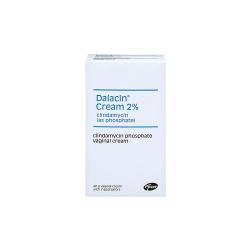 Excellent
4.8
4 patients have reviewed Dalacin on Trustpilot
Excellent
4.8
4 patients have reviewed Dalacin on Trustpilot
Further reading

The Effects of Alcohol on Antibiotics: Complete Safety Guide
Reviewed by Dr. Caroline Fontana
5 foods to eat while on antibiotics
Reviewed by Dr. Caroline Fontana
Burning sensations after sex: causes, treatments and when...
Reviewed by Dr. Caroline Fontana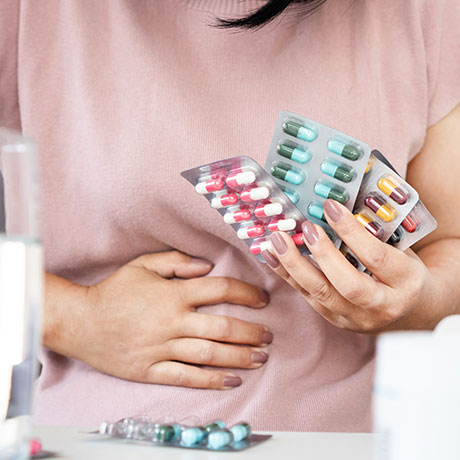
Metronidazole side effects & how to manage them
Reviewed by Dr. Caroline Fontana
Select
medicationFill out a short
medical formDoctor issues
prescriptionMedication sent
from pharmacy
- Reachable and friendly customer serviceCustomer service online now: Mon-Fri 08:00 - 17:00
- All-inclusive service - No hidden feesAll prices include shipping & prescription
- Next day deliveryFor all orders before 16:30
